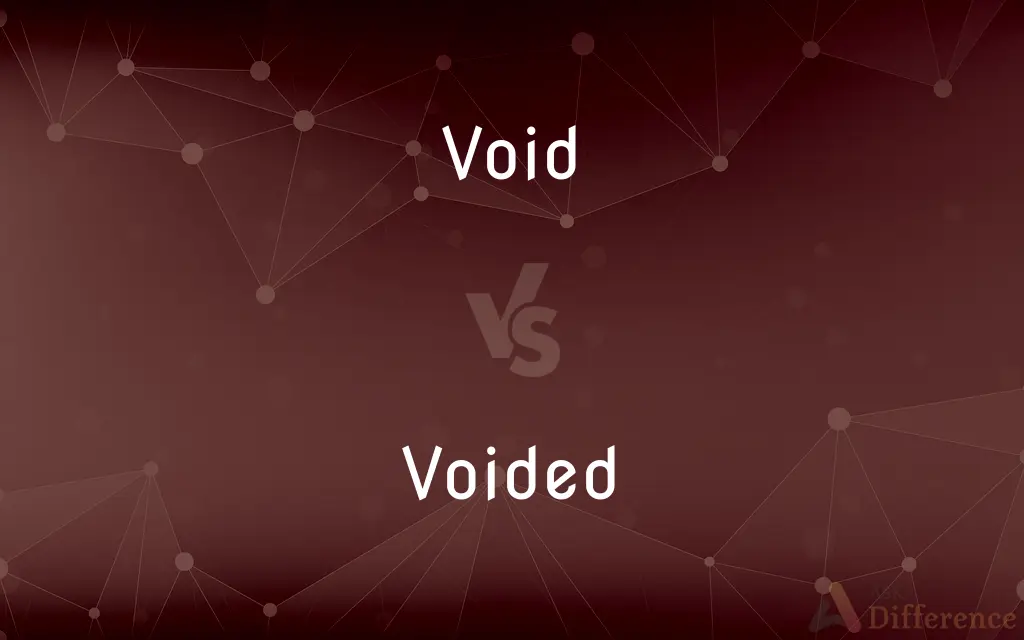Void vs. Voided — What's the Difference?
Edited by Tayyaba Rehman — By Fiza Rafique — Updated on April 5, 2024
Void denotes something that is empty or null, lacking legal force, whereas voided refers to the act of making something void, often used in legal and contractual contexts.

Difference Between Void and Voided
Table of Contents
ADVERTISEMENT
Key Differences
Void is a term often used to describe an absence or a vacuum, implying something that is empty or devoid of content. It's also used in legal contexts to describe something that is null, without legal force or effect. On the other hand, voided is the past tense of void, referring to the act of declaring something null and void, canceling or annulling it. This action can be applied to contracts, agreements, or even physical items like tickets or vouchers.
While void can denote a state of emptiness or nonexistence in a physical, legal, or metaphorical sense, voided specifically implies an action has been taken to nullify or cancel something. Void can be inherent or a natural state, like a void in space, whereas voided suggests an intervention to change a previously valid or filled state into one that is void.
In legal terms, a contract or agreement that is void is one that lacks enforceability from the outset, perhaps due to illegality or impossibility. A voided contract, however, starts as valid but becomes unenforceable because one party takes action to cancel or annul it. The distinction is significant in understanding the legal status and the implications for the parties involved.
Void can also be used more broadly in various contexts, such as in science to describe empty spaces in materials or in astronomy to describe large empty spaces between galaxies. Voided, being action-oriented, is more commonly used in contexts where human actions nullify or cancel previously valid states or items.
The concept of void is integral to discussions about space, existence, and legality, highlighting absence or nullity. Voided, by contrast, emphasizes the transformation from a state of validity or fullness to one of nullity or absence, underscoring the effect of human actions or legal decisions.
ADVERTISEMENT
Comparison Chart
Definition
Describes an empty or null state, or lacking legal force
Refers to the act of making something null or invalid
Nature
Inherent state or condition
Result of an action
Common Contexts
Physical, legal, metaphorical
Legal, contractual
Examples
Empty space, void contract
Voided check, voided agreement
Key Characteristics
Absence, emptiness, nullity
Cancellation, annulment, action taken
Compare with Definitions
Void
Denotes emptiness or lack of content, legally or physically.
The room felt like a void without her presence.
Voided
Act of making something no longer usable or valid.
The check was voided to prevent unauthorized cashing.
Void
An empty space or vacuum.
Scientists study voids in the universe to understand galaxy formation.
Voided
The state resulting from having been made void.
The voided documents were shredded for security.
Void
Anything that lacks validity, substance, or significance.
His promises turned out to be void of sincerity.
Voided
Something that has been made null, invalid, or void.
The ticket was voided after the cancellation.
Void
A contract that is inherently invalid or without legal effect.
The agreement was void due to fraudulent terms.
Voided
The process of annulling a contract or agreement.
The contract was voided by mutual consent.
Void
A feeling of emptiness or lack.
There was a void in his heart after the loss.
Voided
Making previously valid items or agreements void.
The policy was voided due to non-compliance with new regulations.
Void
Containing no matter; empty.
Voided
Having the central area cut out or left vacant, leaving an outline or narrow border
A voided lozenge.
Void
Not occupied; unfilled.
Voided
Simple past tense and past participle of void
Void
Completely lacking; devoid
Void of understanding.
Voided
With the centre cut out.
Void
Ineffective; useless.
Voided
Emptied; evacuated.
Void
Having no legal force or validity; null
A contract rendered void.
Voided
Annulled; invalidated.
Void
(Games) Lacking cards of a particular suit in a dealt hand.
Voided
Having the inner part cut away, or left vacant, a narrow border being left at the sides, the tincture of the field being seen in the vacant space; - said of a charge.
Void
An empty space.
Void
A vacuum.
Void
An open space or a break in continuity; a gap.
Void
A feeling or state of emptiness, loneliness, or loss.
Void
(Games) Absence of cards of a particular suit in a dealt hand
A void in hearts.
Void
To take out (the contents of something); empty.
Void
To excrete (body wastes).
Void
To leave; vacate.
Void
To make void or of no validity; invalidate
Issued a new passport and voided the old one.
Void
To excrete body wastes.
Void
Nothing; empty; not occupied or filled.
Void
Having no incumbent; unoccupied; said of offices etc.
Void
Being without; destitute; devoid.
Void
Not producing any effect; ineffectual; vain.
Void
Of no legal force or effect, incapable of confirmation or ratification.
Null and void
Void
Containing no immaterial quality; destitute of mind or soul.
Void
That does not return a value; a procedure.
Void
An empty space; a vacuum.
Nobody has crossed the void since one man died trying three hundred years ago; it's high time we had another go.
Void
(astronomy) An extended region of space containing no galaxies.
Void
(materials science) A collection of adjacent vacancies inside a crystal lattice.
Void
(fluid mechanics) A pocket of vapour inside a fluid flow, created by cavitation.
Void
(construction) An empty space between floors or walls, including false separations and planned gaps between a building and its facade.
Void
A black cat.
My little void is so sweet sometimes.
Void
An empty place; A location that has nothing useful.
Void
A voidee.
Void
(transitive) To make invalid or worthless.
He voided the check and returned it.
Void
To empty.
Void one’s bowels
Void
To throw or send out; to evacuate; to emit; to discharge.
To void excrement
Void
To withdraw, depart.
Void
To remove the contents of; to make or leave vacant or empty; to quit; to leave.
To void a table
Void
Containing nothing; empty; vacant; not occupied; not filled.
The earth was without form, and void.
I 'll get me to a place more void.
I 'll chain him in my study, that, at void hours,I may run over the story of his country.
Void
Having no incumbent; unoccupied; - said of offices and the like.
Divers great offices that had been long void.
Void
Being without; destitute; free; wanting; devoid; as, void of learning, or of common use.
A conscience void of offense toward God.
He that is void of wisdom despiseth his neighbor.
Void
Not producing any effect; ineffectual; vain.
[My word] shall not return to me void, but it shall accomplish that which I please.
I will make void the counsel of Judah.
Void
Containing no immaterial quality; destitute of mind or soul.
Void
Of no legal force or effect, incapable of confirmation or ratification; null. Cf. Voidable, 2.
Void
An empty space; a vacuum.
Pride, where wit fails, steps in to our defense,And fills up all the mighty void of sense.
Void
To remove the contents of; to make or leave vacant or empty; to quit; to leave; as, to void a table.
Void anon her place.
If they will fight with us, bid them come down,Or void the field.
Void
To throw or send out; to evacuate; to emit; to discharge; as, to void excrements.
A watchful application of mind in voiding prejudices.
With shovel, like a fury, voided outThe earth and scattered bones.
Void
To render void; to make to be of no validity or effect; to vacate; to annul; to nullify.
After they had voided the obligation of the oath he had taken.
It was become a practice . . . to void the security that was at any time given for money so borrowed.
Void
To be emitted or evacuated.
Void
The state of nonexistence
Void
An empty area or space;
The huge desert voids
The emptiness of outer space
Without their support he'll be ruling in a vacuum
Void
Declare invalid;
The contract was annulled
Void a plea
Void
Clear (a room, house, place) of occupants or empty or clear (a place, receptacle, etc.) of something;
The chemist voided the glass bottle
The concert hall was voided of the audience
Void
Take away the legal force of or render ineffective;
Invalidateas a contract
Void
Excrete or discharge from the body
Void
Lacking any legal or binding force;
Null and void
Void
Containing nothing;
The earth was without form, and void
Common Curiosities
How does voiding something affect its status?
Voiding something cancels or annuls its previous valid status, making it legally or effectively null.
Is a voided check still usable?
No, a voided check is no longer usable or valid for transactions.
What does it mean when something is void?
When something is void, it means it's empty, null, or lacking legal force or effect.
What's the difference between a void and voided warranty?
A void warranty lacks validity from the outset, often due to specific conditions not being met, while a voided warranty starts as valid but is made invalid due to actions like misuse.
Can feelings or emotions be described as void?
Yes, feelings or emotions can be described as void to convey a sense of emptiness or lack.
Are voided agreements legally binding?
No, voided agreements are not legally binding because they have been canceled or annulled.
Can a contract be voided for any reason?
A contract can be voided for specific legal reasons, such as mutual consent, fraud, or violation of laws.
Can digital data be voided?
Digital data can be voided in the sense of being deleted or made inaccessible, though this usage is less common.
Can space be considered void?
Yes, space is often considered void due to its vast empty areas, despite containing cosmic matter.
How do void and voided differ in everyday language?
In everyday language, void describes an absence or emptiness, while voided refers to the action of making something void.
What happens when a law is declared void?
When a law is declared void, it loses its enforceability and effect, often because it's unconstitutional or improperly enacted.
Does voiding a policy require justification?
Yes, voiding a policy usually requires legal justification or a breach of the terms by one of the parties.
Is void the same as invalid?
Void is similar to invalid, as both imply a lack of legal force or effect, but void specifically denotes something inherently null.
What legal documents can be voided?
Legal documents such as contracts, agreements, and checks can be voided under certain conditions.
What is the process to void a transaction?
To void a transaction, specific legal or procedural steps must be followed, often involving the cancellation of the transaction before it's fully processed.
Share Your Discovery

Previous Comparison
Aw vs. Oh
Next Comparison
Serviceable vs. UsableAuthor Spotlight
Written by
Fiza RafiqueFiza Rafique is a skilled content writer at AskDifference.com, where she meticulously refines and enhances written pieces. Drawing from her vast editorial expertise, Fiza ensures clarity, accuracy, and precision in every article. Passionate about language, she continually seeks to elevate the quality of content for readers worldwide.
Edited by
Tayyaba RehmanTayyaba Rehman is a distinguished writer, currently serving as a primary contributor to askdifference.com. As a researcher in semantics and etymology, Tayyaba's passion for the complexity of languages and their distinctions has found a perfect home on the platform. Tayyaba delves into the intricacies of language, distinguishing between commonly confused words and phrases, thereby providing clarity for readers worldwide.
















































